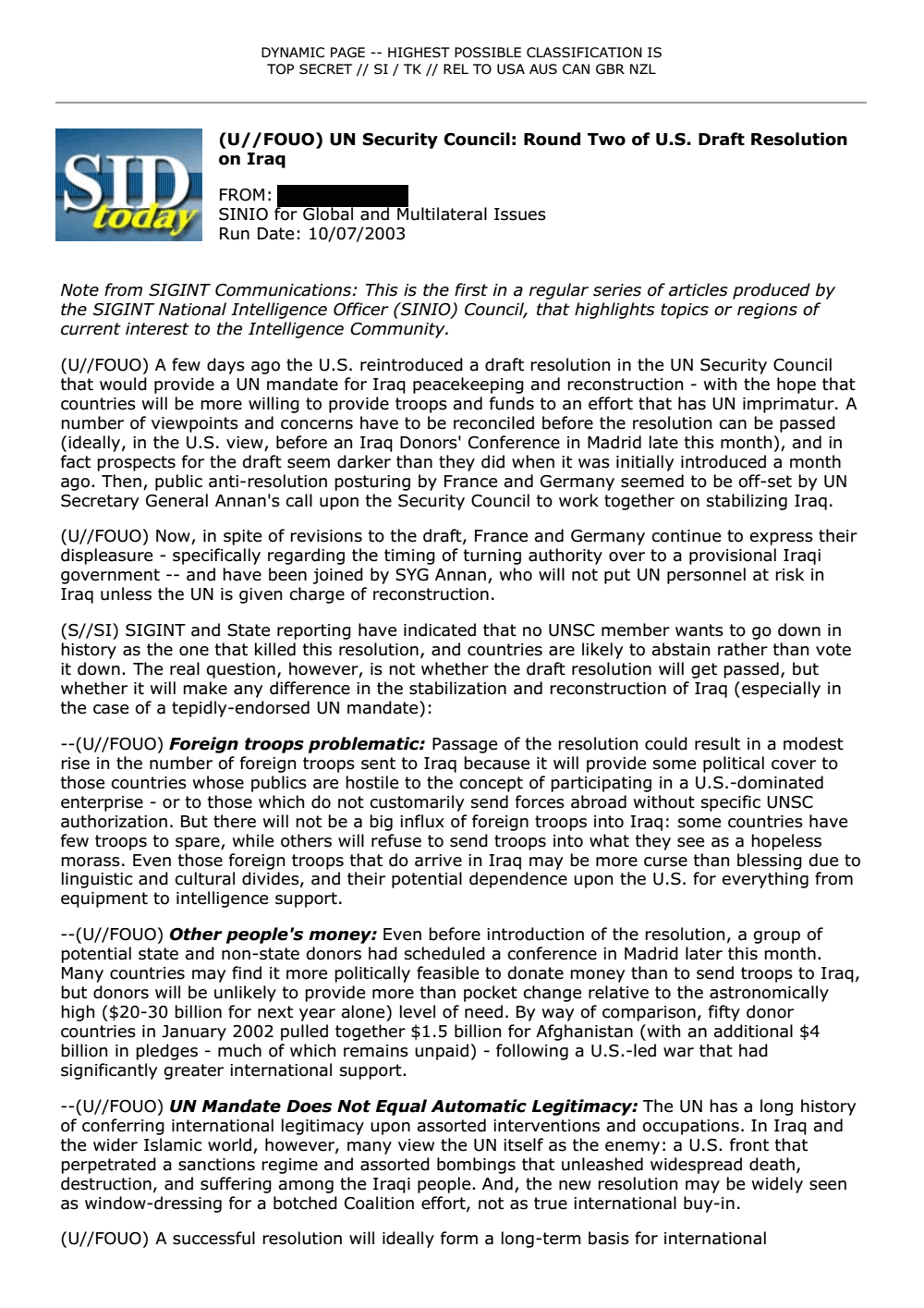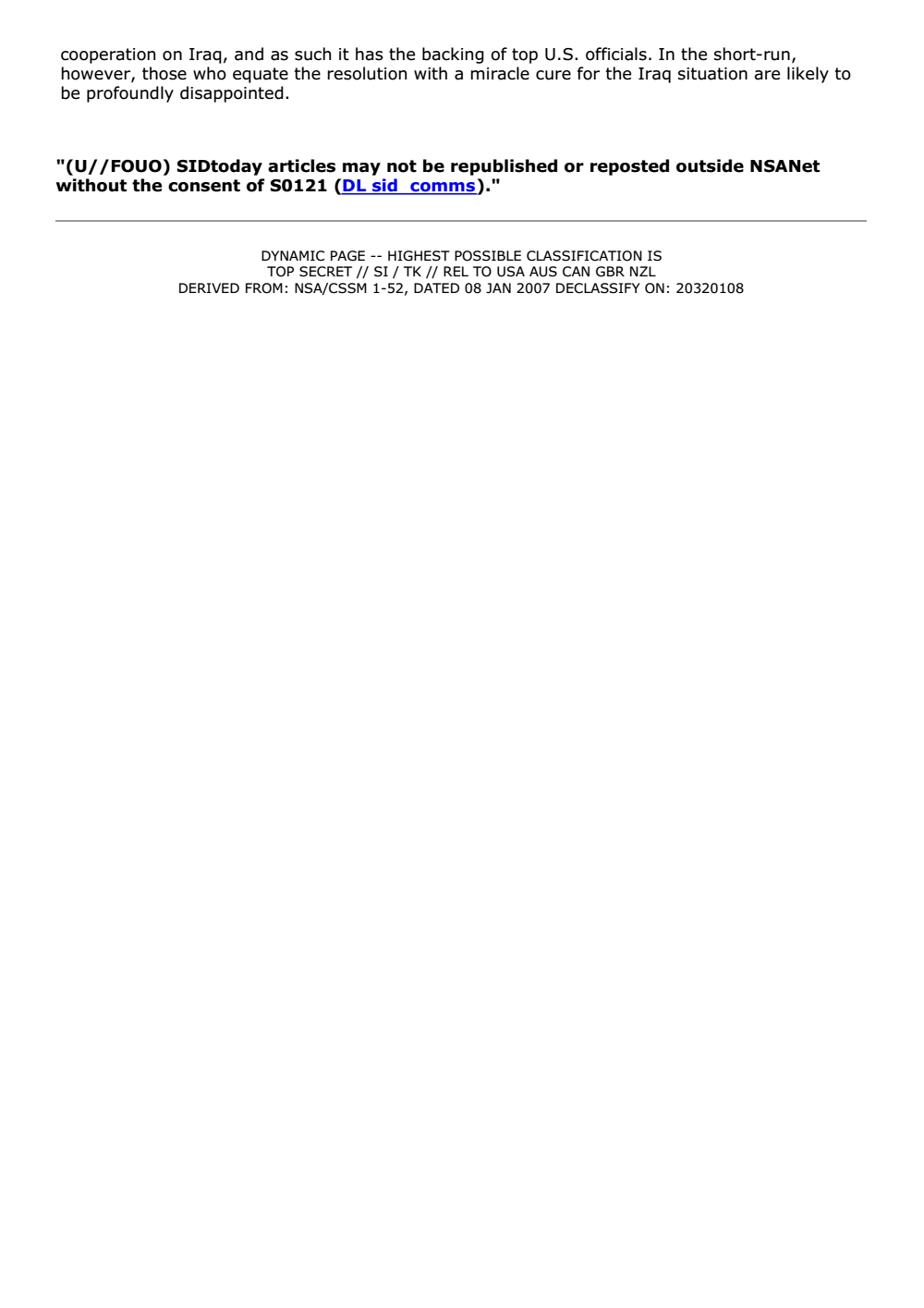
DYNAMIC PAGE -- HIGHEST POSSIBLE CLASSIFICATION IS
TOP SECRET // SI / TK // REL TO USA AUS CAN GBR NZL
(U//FOUO) UN Security Council: Round Two of U.S. Draft Resolution
on Iraq
FROM:
SINIO for Global and Multilateral Issues
Run Date: 10/07/2003
Note from SIGINT Communications: This is the first in a regular series of articles produced by
the SIGINT National Intelligence Officer (SINIO) Council, that highlights topics or regions of
current interest to the Intelligence Community.
(U//FOUO) A few days ago the U.S. reintroduced a draft resolution in the UN Security Council
that would provide a UN mandate for Iraq peacekeeping and reconstruction - with the hope that
countries will be more willing to provide troops and funds to an effort that has UN imprimatur. A
number of viewpoints and concerns have to be reconciled before the resolution can be passed
(ideally, in the U.S. view, before an Iraq Donors' Conference in Madrid late this month), and in
fact prospects for the draft seem darker than they did when it was initially introduced a month
ago. Then, public anti-resolution posturing by France and Germany seemed to be off-set by UN
Secretary General Annan's call upon the Security Council to work together on stabilizing Iraq.
(U//FOUO) Now, in spite of revisions to the draft, France and Germany continue to express their
displeasure - specifically regarding the timing of turning authority over to a provisional Iraqi
government -- and have been joined by SYG Annan, who will not put UN personnel at risk in
Iraq unless the UN is given charge of reconstruction.
(S//SI) SIGINT and State reporting have indicated that no UNSC member wants to go down in
history as the one that killed this resolution, and countries are likely to abstain rather than vote
it down. The real question, however, is not whether the draft resolution will get passed, but
whether it will make any difference in the stabilization and reconstruction of Iraq (especially in
the case of a tepidly-endorsed UN mandate):
--(U//FOUO) Foreign troops problematic: Passage of the resolution could result in a modest
rise in the number of foreign troops sent to Iraq because it will provide some political cover to
those countries whose publics are hostile to the concept of participating in a U.S.-dominated
enterprise - or to those which do not customarily send forces abroad without specific UNSC
authorization. But there will not be a big influx of foreign troops into Iraq: some countries have
few troops to spare, while others will refuse to send troops into what they see as a hopeless
morass. Even those foreign troops that do arrive in Iraq may be more curse than blessing due to
linguistic and cultural divides, and their potential dependence upon the U.S. for everything from
equipment to intelligence support.
--(U//FOUO) Other people's money: Even before introduction of the resolution, a group of
potential state and non-state donors had scheduled a conference in Madrid later this month.
Many countries may find it more politically feasible to donate money than to send troops to Iraq,
but donors will be unlikely to provide more than pocket change relative to the astronomically
high ($20-30 billion for next year alone) level of need. By way of comparison, fifty donor
countries in January 2002 pulled together $1.5 billion for Afghanistan (with an additional $4
billion in pledges - much of which remains unpaid) - following a U.S.-led war that had
significantly greater international support.
--(U//FOUO) UN Mandate Does Not Equal Automatic Legitimacy: The UN has a long history
of conferring international legitimacy upon assorted interventions and occupations. In Iraq and
the wider Islamic world, however, many view the UN itself as the enemy: a U.S. front that
perpetrated a sanctions regime and assorted bombings that unleashed widespread death,
destruction, and suffering among the Iraqi people. And, the new resolution may be widely seen
as window-dressing for a botched Coalition effort, not as true international buy-in.
(U//FOUO) A successful resolution will ideally form a long-term basis for international

cooperation on Iraq, and as such it has the backing of top U.S. officials. In the short-run,
however, those who equate the resolution with a miracle cure for the Iraq situation are likely to
be profoundly disappointed.
"(U//FOUO) SIDtoday articles may not be republished or reposted outside NSANet
without the consent of S0121 (DL sid comms)."
DYNAMIC PAGE -- HIGHEST POSSIBLE CLASSIFICATION IS
TOP SECRET // SI / TK // REL TO USA AUS CAN GBR NZL
DERIVED FROM: NSA/CSSM 1-52, DATED 08 JAN 2007 DECLASSIFY ON: 20320108